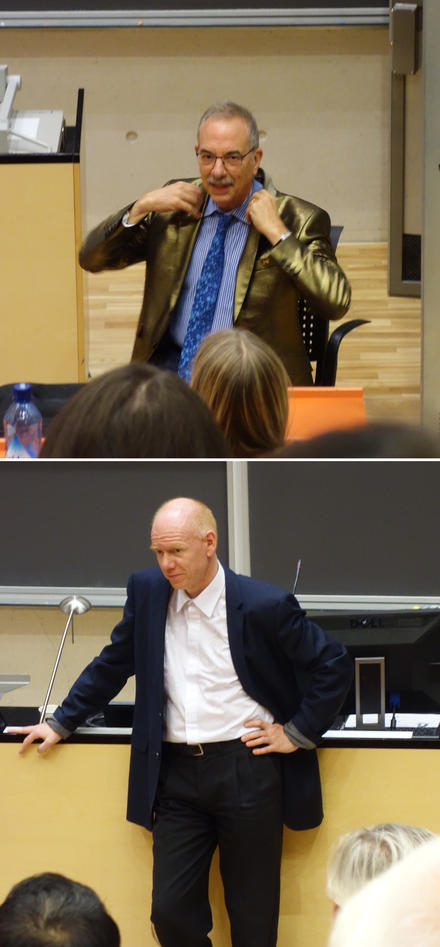The road to excellence
19th September 2018, CCBIO hosted a Special Seminar on the issue of scientific excellence. Speakers Bruce Zetter (Harvard Medical School/Boston Children's Hospital), Merle Jacob (Lund University) as well as Lars A. Akslen (CCBIO) and Roger Strand (SVT/CCBIO) discussed different ways to conceptualise and achieve excellence, leaving the audience both inspired and a little thought-provoked.

Hovedinnhold
CCBIO has this last year had the good fortune to cooperate with Harvard scholars through the INTPART collaboration, aiming for increased contact and mobility between our institutions. Currently Harvard professors are teaching at the CCBIO long course Cancer-Related Vascular Biology, and CCBIO students have recently returned from internship at Boston Children’s Hospital and Harvard Medical School.
What is Excellence?
CCBIO is a Norwegian Centre of Excellence. But what do we understand by excellence? In this special seminar, the ambition was to go deeper into the issue of quality and excellence in science. Apart from scholars from the medical fields, the issue also attracted participants from the other UiB faculties, showing the general relevance of the topic. Many if not most researchers experience external pressure for excellence in addition to their own internal motivation for high performance – but how may excellence be achieved?
Excellence in Science is Hard to Measure
The speakers and debate participants had no easy answers for the audience but they did provide ideas about elements of excellence: vision, creativity, novelty, go for quality above quantity. The balance between focus and openness to other ideas and people was another topic of the discussion. In his talk, Bruce Zetter also insisted on one necessary condition for excellence that never should be taken for granted but sometimes is: research integrity.
All speakers agreed that from the point of view of the practicing researcher, there neither can nor be one recipe or one singular notion of excellence. Zetter summarised it as follows: "We all need to have our own definition of excellence, and continuously try to exceed our own norms." And then he continued on to exceed his own norm there and then, switching jackets with Roger Strand, looking exceedingly excellent in his golden jacket!
By No Means Straight-Forward
Merle Jacob, a leading researcher on research policies and research funding organisations, provided a sobering perspective on the policy goals behind excellence funding. Painting with a large brush, she described how research communities have been attracted and flattered by policy talk (and money) of excellence. In this way they have allowed themselves to be governed as hoped for by the funding organisations: They have self-organised into more thematic coordination, producing locally critical mass on certain research topics. Paradoxically, she claimed, what the funding organisations wish for, is already to a large extent achieved by the centre proposals themselves.
Still, public spending on excellence is in need of justification in terms of its performance, but evaluation of centres of excellence is notoriously difficult: "Given that these centres were already excellent, excellence cannot be a credible outcome", she explained. On the other hand, the funding instruments are not set up to encourage research that really is taking high risk. Indeed, funding decisions are in practice made by reference to past achievements, rewarding researchers who have shown excellence in the past.
In her conclusion, she went as far as predicting that centre of excellence funding most likely will be discontinued in the long-term perspective unless it can be empirically shown that the funding makes a difference.
Growing Excellence
In sum, research communities’ notions of excellence and policy discourses using the same word both exist in the same universe, and the ambitious researcher needs to know them both. Knowing them also means knowing how they differ. While Lars A. Akslen is in charge of an operation that has to report to the Research Council of Norway by their criteria, he contemplated his role as director of a centre of excellence also in terms of how to organise well the research that actually is taking place: "I watch out for the good seeds, and try to create a great soil", he said.
